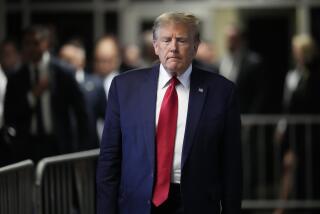Martha Stewart Hearing Delayed
- Share via
NEW YORK — A federal judge has postponed Martha Stewart’s sentencing, which some legal experts believe means the judge will take seriously the defense’s claims that alleged perjury by a federal agent should invalidate Stewart’s conviction.
U.S. District Judge Miriam Goldman Cedarbaum put off the sentencing of Stewart and her former stockbroker, Peter E. Bacanovic, to July 8 from June 17, Stewart’s attorneys said Monday. They intend to file motions this week requesting a new trial on grounds that the federal agent lied on the stand.
For the record:
12:00 a.m. June 9, 2004 For The Record
Los Angeles Times Wednesday June 09, 2004 Home Edition Main News Part A Page 2 National Desk 1 inches; 49 words Type of Material: Correction
Martha Stewart case -- An article in Tuesday’s Business section about the postponement of Martha Stewart’s sentencing referred to Larry F. Stewart, charged with lying on the witness stand, as a federal agent. He is the director of the U.S. Secret Service forensic laboratory but is not an agent.
The judge could have gone ahead with sentencing and dealt with new-trial motions later. By choosing postponement, “it seems very clear that at least she will consider these issues very carefully,” said Laura Ariane Miller, a white-collar defense lawyer with Nixon Peabody in Washington.
Cedarbaum earlier rejected a new-trial motion based on a juror’s alleged false statements during pretrial screening. Securities-law specialist Anthony Pacheco said the defense had a stronger case now.
“It’s a much more serious allegation when there’s perjured testimony by a government officer,” said Pacheco, of law firm Proskauer Rose in Los Angeles. “I would expect her to work hard to get to the bottom of this,” he said of Cedarbaum.
Stewart and Bacanovic were convicted March 5 of conspiracy, obstruction of justice and lying to the government. They face likely prison sentences of 10 to 16 months.
The charges stemmed from Stewart’s December 2001 sale of stock in biotech firm ImClone Systems Inc. just before bad news sent the shares tumbling. Stewart and Bacanovic contended that she sold not because of insider information but because they had a prior agreement to sell if the share price fell below $60.
In their new-trial motions, the defense lawyers will cite perjury charges brought last month against Larry F. Stewart, chief of the U.S. Secret Service’s forensic laboratory. The motions “will contend that the jury was unfairly affected” by the alleged perjury, Martha Stewart’s lawyers, Robert G. Morvillo and John J. Tigue, said in a statement.
Testifying as an expert witness on ink analysis, Stewart (no relation to Martha Stewart) forcefully backed up the government’s claim that Bacanovic doctored a brokerage worksheet to support the account of the $60 sale agreement.
Agent Stewart testified that lab tests proved the notation “@60” next to a stock symbol for ImClone was in ink that was different from that used in all the other handwriting on the worksheet.
In the May 21 perjury complaint, the government said Agent Stewart lied repeatedly about his involvement in the tests, falsely testifying that he personally supervised and helped perform the chemical analyses. In fact, according to the complaint, the tests had been completed by a subordinate and approved by a supervisor before the lab director even learned that prosecutors had requested them.
Agent Stewart’s Washington-based defense lawyer, Judith L. Wheat, said Monday that her client “believes he was upfront with the government about his role in the testing and that his testimony was truthful.”
Prosecutors did not return a call for comment. But in announcing Larry Stewart’s arrest last month, they said the ink tests were valid and insisted that the convictions were not compromised by the perjury charges.
Defense lawyers, according to a person in their camp who asked not to be identified, are expected to focus on a section of the complaint that says Agent Stewart told a fellow Secret Service employee that the lab scientist who performed the original test on the Bacanovic document had botched the analysis. That conflicts with Stewart’s testimony -- and the government’s ongoing contention -- that the tests were valid.
The complaint doesn’t describe how Agent Stewart may have thought the tests were bungled, but defense lawyers contended that the Secret Service failed to test several marks on the worksheet that may have been written in the same ink as the “@60” notation.
It’s clear from the context of the 15-page complaint that Stewart’s co-workers alerted investigators to problems with his testimony. But according to Pacheco, a troubling question is why it took more than 2 1/2 months after the verdict to bring the alleged perjury to light.
“Everybody in America was watching that trial. Why didn’t the people in the lab come forward sooner?” Pacheco said. “Wasn’t that information important for the defense to know?”
Although Bacanovic was cleared of the specific charge related to the worksheet, the lab director’s testimony probably helped tarnish the overall credibility of both defendants in the jury’s eyes, Pacheco said. And if that testimony was false, he added, “the defense can very well ask, ‘Was this a fair outcome?’ ”
Shares in Stewart’s company, Martha Stewart Living Omnimedia Inc., closed Monday at $9.64, up 26 cents on the New York Stock Exchange.
More to Read
Inside the business of entertainment
The Wide Shot brings you news, analysis and insights on everything from streaming wars to production — and what it all means for the future.
You may occasionally receive promotional content from the Los Angeles Times.










